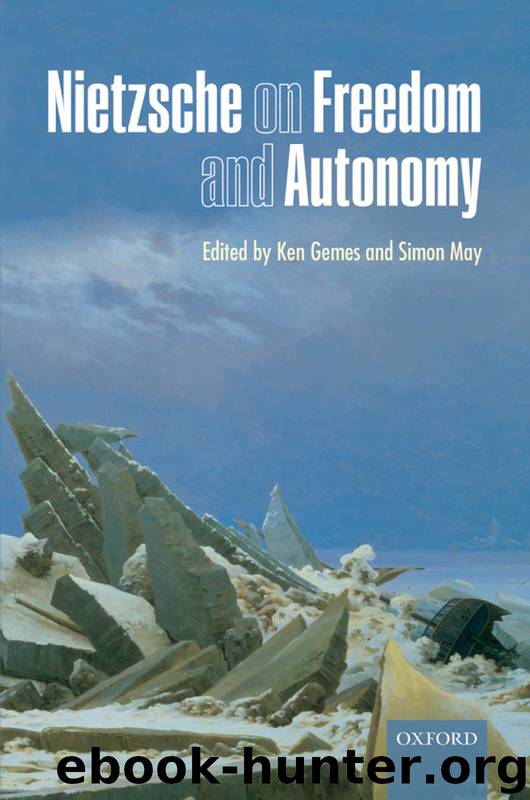Nietzsche on Freedom and Autonomy by Gemes Ken; May Simon; & Simon May

Author:Gemes, Ken; May, Simon; & Simon May
Language: eng
Format: epub
Publisher: Oxford University Press, Incorporated
Published: 2009-06-14T16:00:00+00:00
3. THE FREE SPIRIT AND THE CRITIQUE OF THE WILL TO TRUTH
Besides its role in the constitution of full-fledged, ‘autonomous’ personhood, freedom also figures as a substantive evaluative ideal in Nietzsche’s later philosophy. In this concluding section, I want to focus on one component of his talk of freedom in this latter context that has received relatively little attention in the literature. We encounter it in passages like these:
All these pale atheists, anti-Christians, immoralists, nihilists; . . .—they certainly believe that they are as completely liberated from the ascetic ideal as possible, these ‘free, very free spirits’; and yet, to disclose to them what they themselves cannot see—for they are too close to it themselves: this ideal is precisely their ideal, too . . .—if I have guessed any riddles, I wish that this proposition might show it!—They are far from being free spirits: for they still have faith in truth. (GM III 24)
I do not think that we do full justice to Nietzsche’s point here, and to the revolutionary significance he associates with it, if we take him to be saying merely that there may be more important things than either purely theoretical or scientific enquiry—after all, many (probably most) people who are not professional philosophers or scientists would be willing to agree to that. I submit that in order really to take seriously the radicality Nietzsche himself sees in his position, we should take him to be proposing a quite novel way of interpreting the relation between our practical, necessarily evaluating, ‘life’, and our theoretical, and in particular our metaphysical, beliefs. One traditional way of interpreting this relation is unambiguously rejected by him, although this rejection is hardly original. As the passage from GS 301 cited earlier indicates, the phenomenal objectivity of many values often gives rise to the delusion that values are metaphysically objective: that they are existentially and/or conceptually independent not just of any particular affective experience, but of such experiences altogether. The temptation is to think of affective experiences as discovering value properties exemplifiable without them, rather than as coconstituting value. Nietzsche emphatically denies that values are metaphysically objective properties:
Whatever has value in our world now does not have value in itself, according to its nature—nature is always valueless—but has been given value at some time, as a gift; and we were the givers and bestowers! Only we have created the world that concerns human beings! (GS 301)
Truly, human beings have given themselves all their good and evil. Truly, they did not take it, they did not find it, it did not descend to them as a voice from heaven. Humans first placed values in things. … Only through valuating is there value. (Z, ‘Of the Thousand and One Goals’)
According to Nietzsche, value existentially depends on the existence of affective experiences and is actualized only in or through them. This is what he means when he says that value is not ‘found’ but ‘created’ by ‘evaluating’ (GS 301), that morality is only a sign-language of
Download
This site does not store any files on its server. We only index and link to content provided by other sites. Please contact the content providers to delete copyright contents if any and email us, we'll remove relevant links or contents immediately.
| Anthropology | Archaeology |
| Philosophy | Politics & Government |
| Social Sciences | Sociology |
| Women's Studies |
The Swerve by Greenblatt Stephen(1082)
Friedrich Nietzsche by Curtis Cate(968)
History Of Western Philosophy by Bertrand Russell(827)
The Swerve: How the World Became Modern by Stephen Greenblatt(741)
The Bloomsbury Encyclopedia of Philosophers in America From 1600 to the Present by Shook John R(712)
The Birth of Tragedy by Friedrich Nietzsche(690)
Mere Christianity by Lewis C. S(681)
Beyond Fate by Margaret Visser(554)
The Great Divorce by C. S. Lewis(540)
The Forbidden Universe: The Origins of Science and the Search for the Mind of God by Lynn Picknett & Clive Prince(537)
El Mundo de Sofía by Jostein Gaarder(526)
The Age of Wonder: The Romantic Generation and the Discovery of the Beauty and Terror of Science by Richard Holmes(519)
God and the Atom by Victor J. Stenger(443)
Freedom's Right by Axel Honneth(427)
How to Think About the Great Ideas by Mortimer J. Adler(426)
Leviathan by THOMAS HOBBES & MICHAEL OAKESHOTT & RICHARD S. PETERS(411)
A Discourse on Inequality by Jean-Jacques Rousseau Maurice Cranston (translator)(384)
Existentialism and Excess: The Life and Times of Jean-Paul Sartre by Gary Cox(383)
The Hedgehog and the Fox by Ignatieff Michael Hardy Henry Berlin Isaiah(375)
